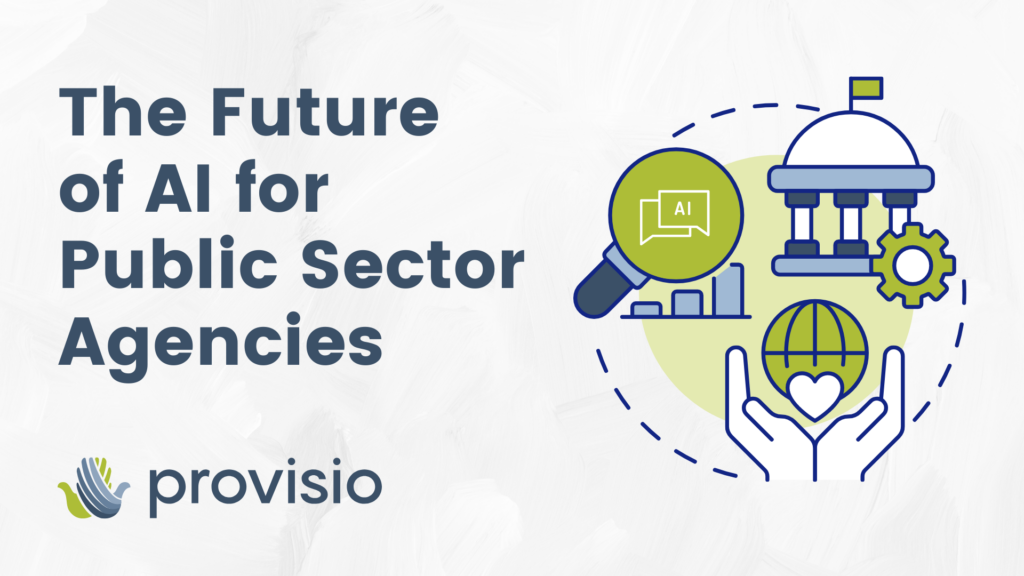Artificial intelligence will radically change how the world operates by 2030. By delegating the most tedious parts of our jobs to this powerful technology, we will work more efficiently and accomplish more, too. For the private sector, AI’s most important function will be to boost revenue. However, for the public sector, it will make government more effective, resulting in major societal improvements. For now, its most crucial usage is automating repetitive tasks like data entry, freeing up human workers to focus on more creative tasks. Salesforce is already leading the charge on this front with its Einstein AI tool for CRM. More on that later.
How Government Will Harness AI
AI Chatbots for Inquiries
AI chatbots will handle inquiries for government services like building permits and financial aid. Compared to a standard automated phone system, this will garner faster and more helpful responses, particularly for complicated service requests. For the agencies themselves, smaller customer service departments will free up money for other departmental priorities.
Predictive Analytics to Streamline Applications
AI will also streamline the processing of claims for unemployment assistance or disability benefits. Harnessing historical data from other applications, AI will immediately flag which applicants are most likely to receive approval, expediting their processing. This means faster services for constituents and less work for staffers.
Safeguarding Election Integrity
With election integrity front-and-center of the national conscience, AI will be an effective tool to alleviate concerns about illegal ballots. Signature-matching for mail-in ballots is a time consuming and sometimes flawed process. With AI pattern recognition technology, a ballot signature can be automatically compared to the signature on record to verify a voter’s identity. According to The Council of State Governments, at least 29 counties in 8 states already used AI to verify ballot signatures in 2020. That number will surely rise by the end of the decade.
Safer Transit & Faster Emergency Response
At the local level, AI will analyze traffic patterns to accommodate real-time traffic conditions by changing stop lights on the fly. This could ease your morning commute, and it would also be a great tool for emergency responders to arrive at their destinations safer and faster. AI-controlled stop lights could clear the way for them as they zip through traffic.
Public transit will operate more efficiently, too. AI will use historical data on public transit usage to address real-time demand by recommending smarter deployment of trains and buses. If there’s a road block or an accident, AI will determine the best possible route to get people where they need to go as fast as possible.
Public Safety Assistance
AI will also play a key role in law enforcement. For instance, investigators will be able to rely on it to sift through CCTV footage to locate a missing person or a suspected criminal. This was once a tedious, time-consuming task which didn’t always get results. AI analytics will also help predict where crimes and most likely to occur and when, allowing police to efficiently deploy resources where they are most needed ahead of the crime occurring.
Necessary Foundations to Leverage AI
The rise of artificial intelligence will inevitably lead to a more efficient society. However, In order to fully leverage AI in the most effective and safe way possible, you must do the necessary foundational work. This includes achieving the following:
Data Quality: Bad data will foster bad AI. You must ensure the accuracy of your data so AI can actually feed you the results you desire.
Data Governance: AI can do incredible things, but it must be regulated to ensure it remains safe, legal & ethical. This includes efforts to prevent non-consensual harvesting of data. It also guardrails against discrimination, as AI has not yet proved it can overcome biases field by data.
Data Literacy: You can’t make your data work for you if you don’t understand it or what you want to do with it. If you learn about your data and consider what it can actually offer you, you can ask the right questions to draw conclusions that will spark better decisions.
Provisio: Your Partner to Embrace AI
The public sector will need to wait a few more years for the most exciting developments in AI. However, government agencies can now begin to implement AI functionality with Salesforce’s Public Sector Solutions. With Public Sector Einstein 1 for Service, government agencies can harness AI to generate case reports, document case interactions, and transcribe calls. Think of Salesforce Einstein as the first step to unlocking the historic productivity and savings of AI. However, AI like Salesforce Einstein can only do its best work when it’s supported by good data. That means migrating all your siloed data into one place and cleaning up anything that’s incorrect, irrelevant, or redundant. As the largest Salesforce consultancy focused solely on health and human services, Provisio will migrate and organize your data to usher you into the AI generation with Salesforce Einstein.
Tom Moran lives in Highland Park, IL and spends much of his summers in Green Lake, WI. Besides content writing for Provisio, he also teaches a broadcast writing course at Columbia College Chicago. Tom loves jam bands and extended guitar solos.

